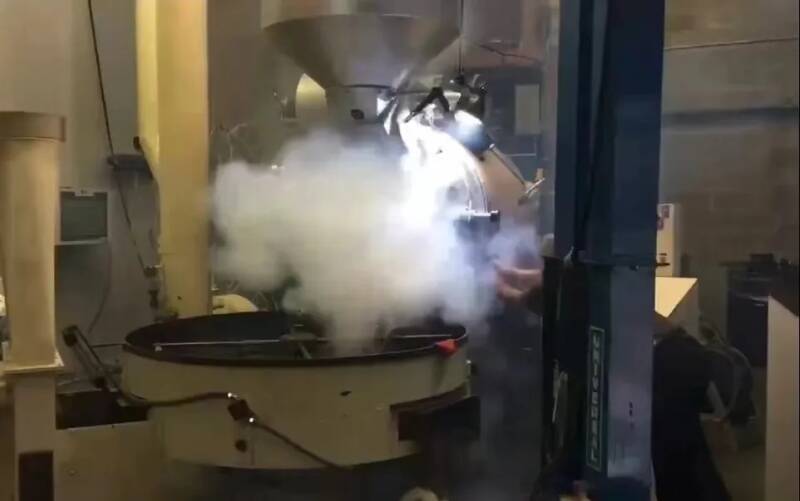Is the smoky taste in coffee a problem with baking? What is the difference between deep-roasted and light-roasted coffee? What is charcoal coffee?
I believe that you have more or less felt in the coffee similar to the smoked taste, a special aroma produced by the burning of herbs, wood and other materials. But do you know that there is not only one kind of smoky taste in coffee, there are many factors that will lead to the appearance of smoky taste! The smoked aroma from different sources will have different performance, good and bad. So today, Qianjie will share what will make coffee beans smell of smoke.
First, beans are "smoked" to the point that many friends may immediately think of the problem of baking, which is right. The raw coffee bean itself contains a lot of water, which will be transformed into steam as the furnace temperature rises during baking. At first, the water vapor will not be released because of the airtight structure of the beans, and continue to accumulate. But as the baking advances, when the beans can no longer hold the emerging water vapor, they will burst, with a large amount of silver skin falling off, and the smoke will be released. So this node is what we call "an explosion". The beginning of an explosion means that the coffee beans have been cooked, so we can stop baking and bake the coffee beans at any node after the explosion.

But it is important to know that the explosion of coffee beans is dense, so this will allow a lot of smoke to accumulate in the roaster in an instant. If we choose to continue baking, then we need to open the throttle and discharge the smoke and the fallen silver skin. If it is not discharged in time, the smoke will continue to wander in the furnace and then be absorbed by beans, and the absorbed smoke will be perceived by us in the coffee. However, the smoky taste produced by this reason is very abrupt in shallow roasted coffee, choking the nose and even sticking the throat. So if there is an obvious smoky taste in the light roasted coffee. Then in general, this kind of taste will be classified as defective taste.
Second, very deep baking what is mentioned above is the poor performance of smoky taste in shallow roasted coffee. Let's talk about another factor that produces smoky taste because of roasting, that is, coffee beans are roasted more deeply. Although we have a good exhaust, but when the coffee beans are roasted for too long, it will also give birth to a sense of smoke. But the smoky taste here will be very soft, and because the taste of deep-roasted coffee is very appropriate, not abrupt.
Third, special roasting methods the early roasting of coffee beans could not have the same convenient gas and electricity as they do now. Instead, only the most primitive charcoal fire can be used as a heat source for baking. In this way, the coffee beans will be contaminated with the smoky smell of burning materials, and this flavor will be extracted and integrated into the coffee as the beans are extracted. Although this way of roasting violates food safety laws, this kind of coffee will have a more abundant aroma and will make the coffee sweeter because of the smoky taste. And this kind of coffee has a proper name: "charcoal-fired coffee".
It is worth mentioning that different materials are used when burning, which will bring some changes to the smoky taste of coffee.
Fourth, the regional flavor of coffee beans, of course, the smoky taste may also come from the coffee beans themselves, such as Guatemalan coffee beans. We know that 30% of the flavor of coffee beans is determined by the soil they grow, while coffee beans grown in Guatemala have a faint smoky taste.
But the smoky taste of Guatemalan coffee beans is weaker than that produced in other ways, it is a looming existence, and its existence does not make the coffee feel abrupt.
When we cook the extract, the bitterness and miscellaneous taste of the insoluble substances in the coffee beans will be extracted in large quantities. These flavors may contribute to the formation of the smoky taste, but more appropriately, it is a paste taste. Then the taste of Jiaojie probably doesn't need to be said more in front of the street, and everyone can understand it directly.
-END-
Important Notice :
前街咖啡 FrontStreet Coffee has moved to new addredd:
FrontStreet Coffee Address: 315,Donghua East Road,GuangZhou
Tel:020 38364473
- Prev

What is the right degree of grind for espresso? What should I do if the pressure value of the coffee machine cannot go up?
Surprise questions! What is the biggest difference between the extraction method of an espresso machine and the extraction method of a group of people making, brewing and brewing coffee? That's right, it's the difference between pressure! The former is pressurized extraction, while the latter is atmospheric pressure. Because of the pressure, espresso coffee can be extracted in a very short time! and condense the top layer
- Next

Ask for an apology! Nongfu Spring sends a lawyer's letter to the Hong Kong Consumer Council!
▲ Click to pay attention| Daily Boutique Coffee Culture Magazine Coffee Factory Yesterday, the Hong Kong Consumer Council published an article in the latest issue of Choice monthly magazine,"Drinking Water Siyuan 30 Bottles of Water Taste, Minerals, and Safety Testing". The article stated that the Consumer Council tested 30 more common bottled water types on the market in Hong Kong and
Related
- What grade does Jamaica Blue Mountain No. 1 coffee belong to and how to drink it better? What is the highest grade of Blue Mountain coffee for coffee aristocrats?
- What are the flavor characteristics of the world-famous coffee Blue Mountain No. 1 Golden Mantelin? What are the characteristics of deep-roasted bitter coffee?
- Can I make coffee a second time in an Italian hand-brewed mocha pot? Why can't coffee be brewed several times like tea leaves?
- Hand-brewed coffee flows with a knife and a tornado. How to brew it? What is the proportion of grinding water and water temperature divided into?
- What is the difference between Indonesian Sumatra Mantinin coffee and gold Mantinin? How to distinguish between real and fake golden Mantelin coffee?
- What does bypass mean in coffee? Why can hand-brewed coffee and water make it better?
- Unexpected! Ruixing Telunsu lattes use a smoothie machine to foam milk?!
- % Arabia's first store in Henan opens into the village?! Netizen: Thought it was P's
- Does an authentic standard mocha coffee recipe use chocolate sauce or powder? Mocha Latte/Dirty Coffee/Salty Mocha Coffee Recipe Share!
- What is the difference between Vietnam egg coffee and Norway egg coffee? Hand-brewed single product coffee filter paper filter cloth filter flat solution!

